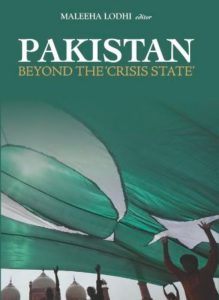The Book in Three Sentences
- In Pakistan Beyond the Crisis State, Maleeha Lodhi challenges the prevailing view of Pakistan as a nation in constant crisis, highlighting its resilience and potential for positive transformation.
- The book explores the intricate political, economic, and security challenges the country faces, emphasizing the essential role of civil society in promoting reform and democratic values.
- Lodhi advocates for a nuanced understanding of Pakistan’s complexities and calls for collaborative efforts aimed at achieving sustainable development and stability.
Book summary
Pakistan Beyond the Crisis State by Maleeha Lodhi provides a nuanced exploration of Pakistan’s political, economic, and social landscape. The author challenges the prevailing narrative that depicts the country as perpetually engulfed in crises, emphasizing its resilience and potential for positive change. Below is an expanded chapter-wise summary along with key quotes from the book.
Chapter 1: Rethinking Pakistan’s Crisis Narrative
In the opening chapter, Lodhi introduces the concept of the “crisis state” and critiques the widespread perception of Pakistan as a nation unable to transcend its challenges. She argues that while the country grapples with significant issues—such as political instability, security threats, and economic struggles—there exists a rich tapestry of societal resilience and hope.
Lodhi underscores the importance of recognizing the achievements of ordinary Pakistanis, including those in education, entrepreneurship, and community service. She advocates for a broader understanding of Pakistan that transcends the crisis narrative, urging stakeholders—both domestic and international—to recognize the country’s potential for growth and transformation.
Important Quote:
“Pakistan is not merely a crisis state; it is a country with aspirations, talent, and the capacity for renewal.”
Chapter 2: Political Dynamics and Governance
This chapter delves into the intricate political dynamics that characterize Pakistan’s governance. Lodhi examines the historical context of civilian-military relations, detailing how the military’s influence has overshadowed democratic institutions. She analyzes the weaknesses in governance that have perpetuated cycles of instability, corruption, and public disillusionment.
Lodhi argues that the lack of effective governance has hindered progress in various sectors, from education to healthcare. She emphasizes the need for accountability and transparency in political processes to restore public trust in government institutions. The chapter calls for a reevaluation of power dynamics in Pakistan, advocating for a strengthened civilian authority that prioritizes the needs and rights of its citizens.
Important Quote:
“The enduring struggle between civilian authority and military power has stymied democratic development and governance.”
Chapter 3: Economic Challenges and Opportunities
In this chapter, Lodhi provides a comprehensive overview of Pakistan’s economic landscape, discussing the challenges that impede growth. She identifies key issues such as high poverty rates, unemployment, and energy shortages, which exacerbate social inequalities and stifle economic progress.
However, Lodhi also emphasizes that Pakistan has untapped potential in various sectors. She highlights the importance of investing in technology, agriculture, and infrastructure to stimulate economic growth and job creation. The chapter advocates for comprehensive economic reforms, arguing that such changes are essential not only for boosting the economy but also for ensuring the legitimacy and stability of the state.
Important Quote:
“Economic reforms are essential not just for growth but for the stability and legitimacy of the state.”
Chapter 4: Security Challenges and Counterterrorism
Lodhi tackles the critical issue of security in Pakistan, focusing on the persistent threats posed by terrorism and extremism. She discusses the historical context of terrorism in the region and the various factors that contribute to radicalization, including social grievances, economic deprivation, and political alienation.
The author analyzes the government’s military response to terrorism, emphasizing the need for a multifaceted approach that includes not only military action but also community engagement and social programs. She argues that addressing the root causes of extremism is vital for long-term stability and security. By fostering inclusive policies that promote education and social welfare, Pakistan can combat the conditions that fuel radicalization.
Important Quote:
“To combat terrorism effectively, we must address the social and economic grievances that fuel radicalization.”
Chapter 5: The Role of Civil Society
In this chapter, Lodhi highlights the indispensable role of civil society in Pakistan’s democratic landscape. She discusses the contributions of grassroots movements, women’s rights organizations, and youth activism in promoting social change and accountability.
Lodhi emphasizes that civil society is a vital counterbalance to state power and a force for positive reform. She illustrates how these organizations advocate for human rights, education, and social justice, often in the face of significant challenges and government resistance. The chapter calls for greater support and recognition of civil society’s role in driving democratic values and fostering a more inclusive political environment.
Important Quote:
“Civil society is not just a counterbalance to the state; it is the bedrock of a vibrant democracy.”
Chapter 6: Regional and Global Context
Lodhi situates Pakistan within the broader regional and global context, analyzing its relationships with neighboring countries and major powers. She discusses the geopolitical dynamics that influence Pakistan’s foreign policy, including its historical ties with China and the United States, as well as its complex relationship with India.
The author stresses the importance of diplomatic engagement and regional cooperation in addressing shared challenges, such as terrorism, trade, and economic stability. She advocates for a proactive foreign policy that emphasizes dialogue and collaboration, arguing that Pakistan’s future is interconnected with its regional environment.
Important Quote:
“Pakistan’s future is inextricably linked to its regional environment; cooperation is not just desirable, it is essential.”
Chapter 7: The Path Forward
In the concluding chapter, Lodhi presents a hopeful vision for Pakistan’s future. She argues that to move beyond its crisis state, Pakistan must embrace a comprehensive approach that acknowledges its challenges while fostering collaboration and innovation.
Lodhi calls for a collective effort from all sectors of society—government, civil society, and the private sector—to work together towards sustainable development. She emphasizes the need for educational reforms, economic investment, and social empowerment to unlock Pakistan’s potential. The chapter ends on a note of optimism, urging readers to envision a Pakistan that is capable of overcoming its struggles and emerging as a resilient nation.
Important Quote:
“The path to a stable and prosperous Pakistan lies in recognizing its complexities and working together to unlock its potential.”
Conclusion
Pakistan Beyond the Crisis State offers a critical examination of Pakistan, challenging the dominant narrative that oversimplifies its realities. Maleeha Lodhi provides readers with a deeper understanding of the complexities and potential within the country, urging a shift in perspective toward one of hope and resilience. This book is a valuable resource for anyone interested in the dynamics of Pakistan and its journey towards a brighter future.
Important quotes










About Author of "Pakistan Beyond the Crisis State"
Maleeha Lodhi is a prominent Pakistani diplomat, academic, and journalist known for her extensive contributions to international relations and public policy. She has served as Pakistan’s ambassador to the United States and the United Kingdom, as well as the first female permanent representative of Pakistan to the United Nations.
Lodhi has been an influential voice in discussions about Pakistan’s political landscape and its role in global affairs, leveraging her expertise to address critical issues facing the country.
In addition to her diplomatic career, she has written extensively on topics related to security, governance, and development, making significant contributions to both academic literature and mainstream media. Her book Pakistan Beyond the Crisis State reflects her deep understanding of the country’s complexities and her commitment to promoting positive change.


Pingback: Pakistan's National Culture Reflects Unity in Diversity (CSS 2017 Solved) | Digital Discite